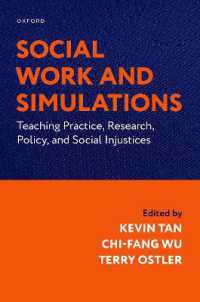Full Description
This ground-breaking volume considers what it means to make claims of disability membership in view of the robust Disability Rights movement, the rich areas of academic inquiry into disability, increased philosophical attention to the nature and significance of disability, a vibrant disability culture and disability arts movement, and advances in biomedical science and technology.
By focusing on the statement, "We are all disabled", the book explores the following questions: What are the philosophical, political, and practical implications of making this claim? What conceptions of disability underlie it? When, if ever, is this claim justified, and when or why might it be problematic or harmful? What are the implications of claiming "we are all disabled" amidst this global COVID-19 pandemic? These critical reflections on the boundaries of disability include perspectives from the humanities, social sciences, law, and the arts. In exploring the boundaries of disability, and the ways in which these lines are drawn theoretically, legally, medically, socially, and culturally, the authors in this volume challenge particular conceptions of disability, expand the meaning and significance of the term, and consider the implications of claiming disability as an identity.
It will be of interest to a broad audience, including disability scholars, advocates and activists, philosophers and historians of disability, moral theorists, clinicians, legal scholars, and artists.
Contents
Introduction: What does it mean to claim "we are all disabled"? PART 1: Theoretical considerations 1. Power, disability, and the academic production of knowledge 2. Depending on the undependable: Disability, fragility, and instability 3. The universal view of disability and its danger to the civil rights model 4. On (not) deserving disadvantage: What kind of difference does "disability" make? 5. Being and deafness: Examining ontology and ethics within the dialectic of hearing-loss and deaf-gain and deafness-and-disability PART 2: Spaces, representations, and lived boundaries 6. Poems 7. "We are all disabled": Feathers, continuities, and a neglected musical argument? 8. Robinson Crusoe and Peter the Wild Boy: What Daniel Defoe inadvertently tells us about disability 9. "We are all disabled": The conundrum of problems and solutions 10. Borderlands and neurodiversity: Aren't we all humans? 11. We are all disabled, until we are not 12. Thoughts on precarity, disablement, and risk during COVID-19 13. Toward disability justice in a pandemic world








